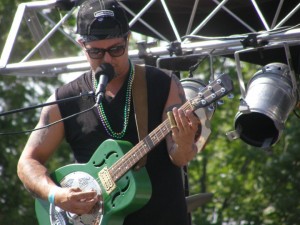 Eric Green is going to be a busy guy this summer. The Maine blues guitarist will be bringing his popular slide guitar sound to festivals and clubs around the Pine Tree State. He just wrapped up his winter time ski resort gigs, and now he’s focused on his summertime coastal rooms. Rockland, Bar Harbor, Portland, and Belfast are his usual summertime haunts.
Eric Green is going to be a busy guy this summer. The Maine blues guitarist will be bringing his popular slide guitar sound to festivals and clubs around the Pine Tree State. He just wrapped up his winter time ski resort gigs, and now he’s focused on his summertime coastal rooms. Rockland, Bar Harbor, Portland, and Belfast are his usual summertime haunts.
Eric Green Party is what he calls his full band, and he’ll be bringing them on May 30th to Hollywood Casino in Bangor Maine at 9:00 p.m.
And, of course, his full band will be playing their big annual event at the Myrtle Street Tavern where he’s been playing for eight years now. EGP is playing the Friday and Saturday nights, July 12 and 13, on the evenings after the North Atlantic Blues Festival closes for the day and the attendees walk the streets doing the club crawl looking for local talent like Green. As a matter of fact, The Myrtle Street Tavern is just across the street from the festival grounds.
Another major event, the Pemaquid Oyster Festival in Damariscotta, Maine. He’ll be on stage late afternoon.
Harry’s Hill will also host EGP. They have three big festivals each year, featuring roots acts from all over New England. The Three day festival will feature EGP on June 21st.
“That’s a pretty cool one. People camp out for the weekend,” Green said. “It’s a really eclectic thing. It’s cool. They do welcome different kind of roots-based acts. You never know who’s going to show up now.”
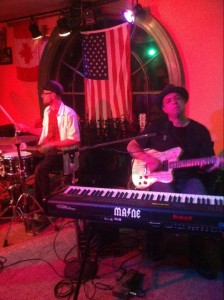 Green has been playing solo gigs in the ski resorts, playing New Orleans barrelhouse piano, dobra, and he still has his weekly Wednesday night gig at Bowen’s Tavern in Belfast, Maine, which he describes as an Irish biker bar.
Green has been playing solo gigs in the ski resorts, playing New Orleans barrelhouse piano, dobra, and he still has his weekly Wednesday night gig at Bowen’s Tavern in Belfast, Maine, which he describes as an Irish biker bar.
By his own admission, marketing himself and his gigs is not Green’s strong suit. You have to watch his Facebook page carefully if you want to see him live, as he posts his gigs weekly.
Green occasionally plays outside of Maine, but he’s played around the country, in different market, including a six year stint in New Orleans. He’s pretty much exhausted all the possibilities and pitfalls of touring. He moved up to Maine over a decade ago, and he stayed up here, as he belongs to a local Native American tribe, Penobscot Indian Nation. That makes him one of only 2,100 hundred Penobscot tribal members left. He’s also, by blood, a Maliseet, on his mother’s side. Maine also suits him just fine as a working musician.
“When I lived in New Orleans, I never had to leave town, hardly ever,” he said. “I’ve adopted that same kind of idea in a state where we have enough tourists that come up through here that just on performance costs, I can make a living playing around this state and still sleep in my same bed. I’ve done the touring thing, and it’s just such a pain in the ass sometimes.” He can make two hundred bucks every Wednesday night for two hours work, which is better than paying travel expenses to go on tour and not make anything.
“It’s hard,” he exclaimed, “especially when it’s such a popularity kind of thing. I’ve gotten good write ups over the year, here and there. I’ve never had any production money behind. I’ve just played a lot of gigs, all the time.”
Green believes his native blood influences his music. He was also an army brat growing up, displaced year after year on different army bases, as his step-father was teaching computers before the computer revolution. He ended up in New Orleans. “I picked up my guitar, and I just kind of went with the primal instincts of myself,” he said. “Early on, I was really into Little Feat and really primitive slidey stuff. When I was 13, I heard Johnny Winter’s Dallas, and immediately my ears perked up. I started listening to Muddy Waters at 13, 14 years old, when all the other kids were listening to Journey. I was just something that felt normal and natural. I just sort of followed that. People would hear me play and say, ‘Dude, you’ve got to go to New Orleans.’”
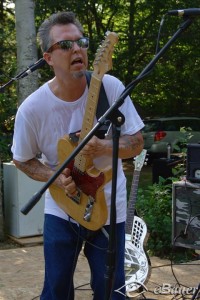 Green survived the New Orleans working musician’s schedule before moving back up north. He now plays a wide range of American roots material from the 1920s to the current day on guitar, dobra, and piano. He can go into Fred McDowell, Mississippi John Hurt, and others from that time and place in music before mixing in some funk and “trucker hillbilly songs.”
Green survived the New Orleans working musician’s schedule before moving back up north. He now plays a wide range of American roots material from the 1920s to the current day on guitar, dobra, and piano. He can go into Fred McDowell, Mississippi John Hurt, and others from that time and place in music before mixing in some funk and “trucker hillbilly songs.”
“I try to keep it old school,” he said. “It’s just a thing that happened and here I am still doing it, in too deep too quit.” He enjoys playing solo gigs because he has the freedom to do things without worrying if the band knows the material. “I can play a song with a lot of chords,” he said. “It’s more on a limb and more improv in terms of my song list of what I’m going to do. Whereas with a band, it’s more of a heavy groove, which is awesome because I’m not holding it all down with my left hand or my thumb.”
Green doesn’t use a pick. He finger picks everything and claws at his guitar. “I can really get down when I have a heavy duty groove going on and work with a band,” he said. “I take this pretty serious. I work on music all the time,” he said. “I’ve been working on jazz harmonies for quite a while. It’s something I don’t do out, but I’m in pretty deep with it. But when I’m doing a solo gig, I have that option of throwing something crazy out there and not having the deer in the headlights look, not putting those guys through that.”
Green said that the economics of playing out with a full band in his home town of Bangor, Maine is a challenge because the population is too small to cater to eclectic tastes. “We’ve got this huge thing up here now,” he said. “There’s 33,00 people living here. They’ve opened a bunch of bars, but it’s still, to justify a four or five hundred bucks cash out in all these places, there just isn’t the population. You got to get the right gigs.”
Green knows that the politics of getting gigs is a strange business so instead of hustling gigs like he did as younger man, he just gravitates to the rooms that favor his kind of music. “I hardly have the stomach for it any more,” he said. “But now, people call me and I know they want me to be there. I wasn’t pushing myself down their throat, going in there, bugging them, and they felt obligated. Now, they call me, and they know what I charge and there you go, and let’s do this.”
Green is attracted to blues music because it always seemed more real to him. His theory is that the early Delta material has a monotonic bass that reminds him of a war drum. “The whole Mardi Gras Indians is paying tribute to the natives for taking in the slaves when no one else would,” Green said. “I think there’s a real mingling. Charlie Patton was half Cherokee. I feel it just goes full circle.”
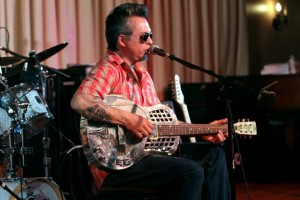 The musician referenced the Hollywood fallacy that depicted Native Americans playing flutes and worshipping eagles. “Most of the Indians I know play blues guitar,” he exclaimed. “I don’t know any Indian that plays flute. Every Indian I know who plays music plays blues guitar.”
The musician referenced the Hollywood fallacy that depicted Native Americans playing flutes and worshipping eagles. “Most of the Indians I know play blues guitar,” he exclaimed. “I don’t know any Indian that plays flute. Every Indian I know who plays music plays blues guitar.”
So, something deep inside Green might have been ignited when his uncle played Muddy Waters for him when he was a kid. “I was instantly like ‘Wow! This is the real shit.’ And, it is. It’s the basis for everything. People go ‘I’m not into the blues.’ ‘Well, listen to what you’re listening to. This is a blues thing.’”
Green said that the pentatonic scale that blues is based on influenced jazz and can be traced back to Asia. “Those Chinese were playing their koto. They were playing blues back then, smoking opium,” he said. “They were all pissed off. They had to work in the rice paddies or something.”
Green’s music is often termed “swampy blues” by people who hear him, and he is fine with that. He enjoys the music of Chris Whitley and John Moonie. “Those two guys are just huge,” Green exclaimed. “John Moonie is semi-responsible if not responsible for using the slide on the New Orleans second line rhythm. Nobody was doing that. He took that Professor Longhair stuff. He started building songs up in a slide way. And I love the Latin, the Latin Mardi Gras mumbo vibe with slide. It’s just a great matching. And, or course, Chris Whitely is another guy who crossed over and played blues but didn’t really blues, but no one really even knows what he played because it was so awesome. He did it on a 1920s National. He sang like he was from Led Zeppelin or something. He was just a really great guy. I got to see him a couple times. He was just like ‘Whoa!’ Of course, you know, he had a little problem with something, you know.”
Green loves the slide sound because, as he puts it: “The slide is just awesome. I don’t know. It’s just one of those things, you know.” Green also pointed out that the slide can have numerous approaches. It can be the main melody line. It can be the rhythm. I can be a chord. It can be the riff. “It’s got to play whatever role,” he said.
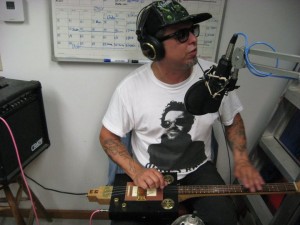 Green owns an assortment of instruments. He said they’re mostly cheap guitars because he’s a working musician who cannot afford a lot of nice things. “I really do this,” he said, chuckling.
Green owns an assortment of instruments. He said they’re mostly cheap guitars because he’s a working musician who cannot afford a lot of nice things. “I really do this,” he said, chuckling.
He often uses a National style guitar and a Tri-cone. He uses a regular guitar, a slide guitar in alternate tuning, a keyboard, and sometimes a lap steel. He owns an assortment of instruments that look really cool in his internet pictures, especially a Gretch lap steel. He also has a Telecaster Thin Line, like Tab Benoit uses but Green’s has P90s pickups. Green’s cigar box lap steel, made by Jim Savage who custom made it for him, is a particularly cool visual.
It was only ten years ago that Green became a keyboardist in earnest. “I picked up a little cheap keyboard for 20 bucks at a yard sale, and all of a sudden, I just started messing with it, and then I taught myself how to read music, and now I’m obsessed with it. I had a big turning point this last year when I finally got Professor Longhair’s ‘Big Chief’ down to a point where it was passable on stage.”
Green’s got some of his songs on MySpace. Those songs come from different collections and albums. His song “Throwdown” is inspired by his experiences in New Orleans. It’s about a place near the Audubon Zoo. “I wrote it pre-Katrina,” he said. “Afterwards, it was just kind of crazy. Actually, that one’s really cool because it’s got Nigel Hall on it. He’s a pretty bad ass dude. He played drums on the Hot All Day song. He’s a multi-instrumentalist.”
“Taste Like Momma’s” is about barbeque with a bit of double entendre. “I don’t know how to explain it,” he said. “When you’re a songwriter, it’s just an affliction I’ve had for a while. What’s the other one? Oh, ’Three Leagues Deep.’ That’s about being at the bottom of ocean. They just come out. Those were all just easy to write. They just kind of happened.”
Green’s life in music may seem haphazard. He wound up in New Orleans. He discovered blues there. He connected it to his Native America roots. Then he moved back to Maine. Green is a driving force of creativity, inspired by blues and his own primal instincts and talent, and he maybe the state of Maine’s best kept secret.
Editor’s Note: The koto is a Japanese traditional instrument. Chinese culture had a similar instrument called zheng at around the same time period. –B.C.

